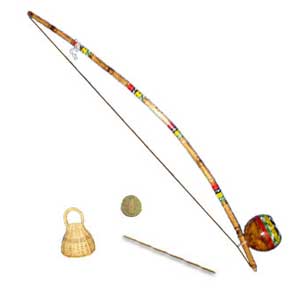Music of Capoeira
"My berimbau... / whosoever should hear it play, / their sorrow, the sorrow they feel, will disappear."
The berimbau, atabaque, and pandeiro are the main instruments of the song of capoeira. The dancer relies on the rhythms as much as the lyrics of the music to generate passion in the dance. The tempo of the song controls how fast or slow the dancer goes.
L to R: berimbau, atabaque, pandeiro
There are many set rhythms for the musicians to play. Some of the more well-known songs include Angola, São Bento Pequeno, and São Bento Grane. Different areas also have their own unique rhythms, sometimes variations of the universal songs.
The accompanying chant, or chula, is key in a capoeirista's dance. While the tempo and the beat of the berimbau set the pace, the chant gives a deeper meaning to the movement. The ladainha, the quadras, and the corridos are three basic chants that contain moral teachings and world views. Old wisdom is also prevalent in the chants.
The chants sometimes feature a call-and-response format. The ladainha is a solo followed closely by a chorus, and is sung before the dance. The quadras consists of the same pattern but with four verses instead of one, as well as the corridos, which only has one or two verses.
The following is a traditional capoeira chant:
No Céu entra quem merece / Na Terra vale é quem tem. / Passar bem ou passar mal, / Tudo na vida é passar, camará.
You enter heaven on your merits; / Here on Earth what you own is all that counts. / Fare you well or fare you poorly, / All on this Earth is but farewell, comrade.
See Capoeira Music for a selection of chants and songs using the berimbau.
Home | History | Dance Styles | Capoeira Today | Bibliography | Perf62 | Basic Terms

.jpg)